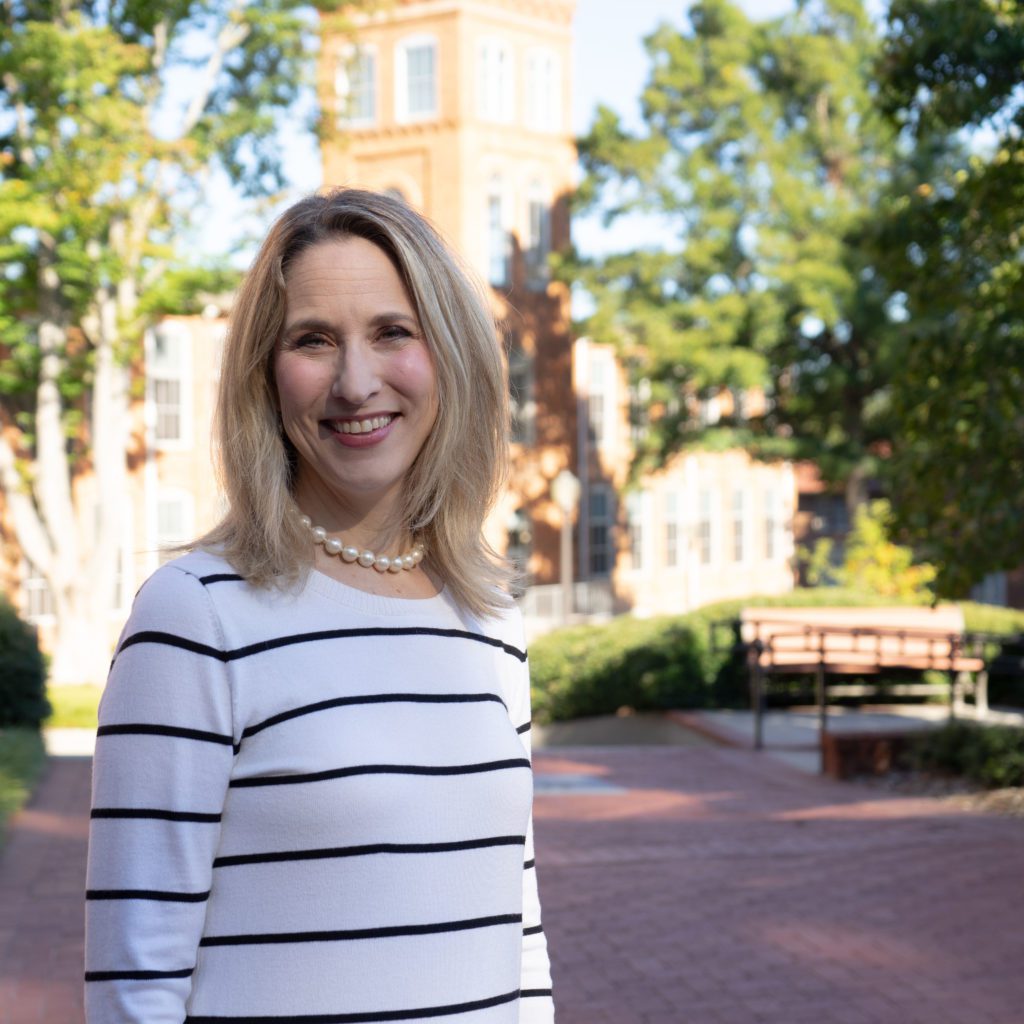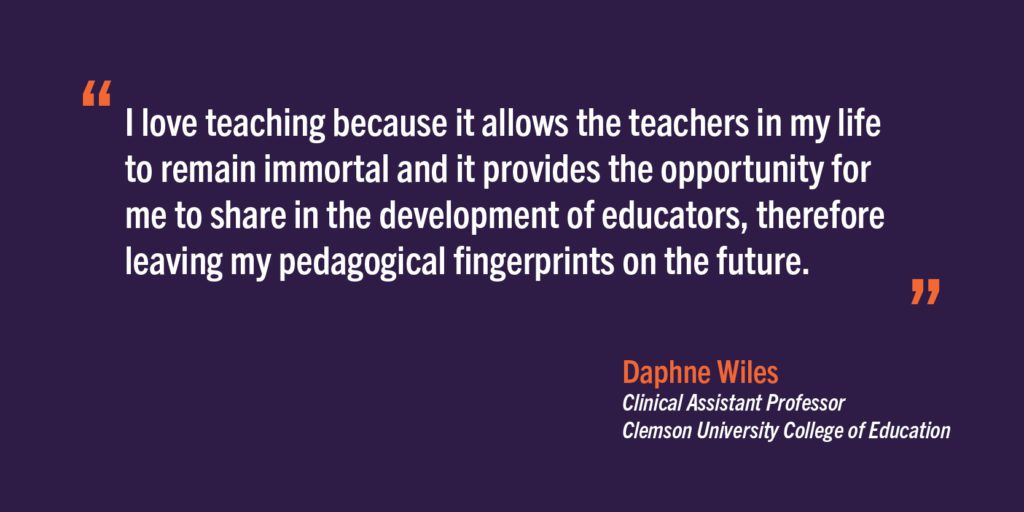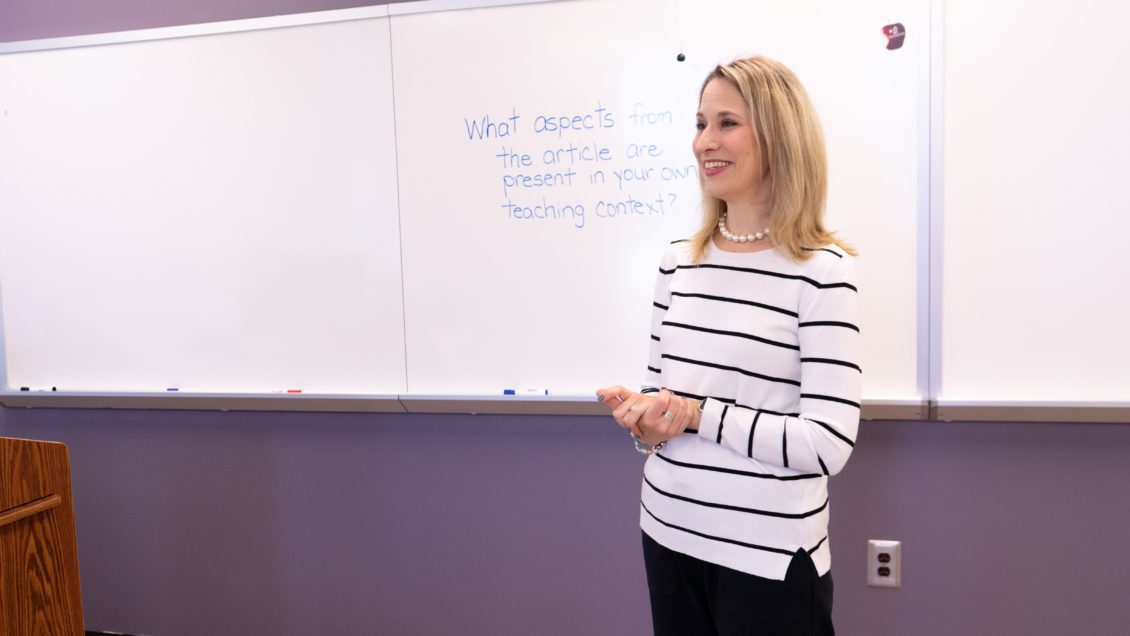Daphne Wiles serves as a clinical assistant professor in the Department of Teaching and Learning. She comes from a long line of educators; both of my parents were teachers, as were many other family members. She said that as she grew up, her life was filled with educational opportunities due to the fact that parent-educators “can’t seem to resist turning each experience into a teachable moment.”
Wiles looks for teachable moments for her students both inside and outside of the classroom while keeping her teaching as relevant to their lives as possible. We caught up with Wiles to discuss her approach to teaching, why she increasingly considers teachers “immortal” and why students should be allowed to fail and try again in the classroom.
What is your teaching philosophy?
My philosophy of teaching is that education should prepare students for a world and life outside of school. Teachers should provide authentic learning experiences that are relevant to students’ lives, spark curiosity and offer meaningful engagement with the curriculum.
In the ideal classroom, students are provided with opportunities for problem solving, critical thinking, development of ideas, testing of theories, analysis, reflection and revision. Traditional siloes of subjects are removed and curriculum is presented in a transdisciplinary manner allowing students to apply their knowledge in practical situations. This simultaneously allows teachers to formatively assess the educational needs of each student in an ongoing way. Providing students the opportunity to work collaboratively while solving problems cultivates kindness, compromise, creativity and new perspectives.

Why do you love teaching?
There is a quote by Jesse Stuart that hung in my grandmother’s house: “I am firm in my belief that a teacher lives on and on through his students. Good teaching is forever and the teacher is immortal.” I didn’t understand this quote when I was young, but as I grew and entered the field of education, I understood the meaning. I love teaching because it allows the teachers in my life to remain immortal and it provides the opportunity for me to share in the development of educators, therefore leaving my pedagogical fingerprints on the future.
How do you ensure equity in teaching?
Transdisciplinary teaching provides equitable learning opportunities that build-up students by meeting them where they are academically and using that knowledge as a foundation for future learning. Each student is worthy, and it is a teacher’s responsibility to help instill in students the belief that they can succeed in school.
Authentic problem solving allows for students to develop perseverance, flexibility and critical questioning. Students should be afforded the opportunity to learn from their mistakes, revise and resubmit assessments, as the ultimate goal of education is student learning.
Education should develop academic excellence through content knowledge, but schools are called to do more to equitably prepare students for a life outside the classroom. Students need to learn how to think critically, to analyze, to practically apply their knowledge and to integrate technology in a safe and responsible way. They need to learn to disagree respectfully, learn from failures, recognize successes, compromise, listen and advocate for their ideas. These academic and life skills are integral components of authentic, meaningful, transdisciplinary teaching; the components of education that I strive for in my own teaching practice.
What qualities do you try to model for your students?
Students deserve teachers who are compassionate, competent, flexible and kind. They deserve teachers who know how to balance the ever-changing landscape of education and be the stable bridge between the political decisions that pull them in one direction and the developmental needs of students that often pull them in the opposite direction. I strive to be a reflective practitioner, ever improving my methods and materials based on present best practices and stay current by reading relevant publications, attending conferences and dialoguing with colleagues and other practitioners.

Name an educator that inspired you to teach.
My fourth-grade teacher, Mrs. Beckley, inspired me to teach. She made learning engaging and fun – every kid at Mount Vernon Elementary School wanted to be in her class. She encouraged us to take risks, learn from our mistakes, persevere and practice kindness. And she had the best laugh.
Describe an effective approach you use in the classroom.
I use “revise and resubmit” for almost every assignment. If a student submits an assignment and earns a grade that they aren’t satisfied with, they are welcome to take my feedback, revise their assignment and resubmit it. My primary objective is that students learn the content, and if it takes a couple tries to get there, I am okay with that.
What is the most rewarding and most challenging aspect of teaching for you?
The most rewarding aspect of teaching is when a student tells me they are excited about something they learned in my class and they plan to implement it into their current teaching context. The most challenging aspect of teaching is when I am not able to engage a student in the content. Despite my best efforts, sometimes a course is not within a student’s interests and that’s tough to reconcile as a teacher.
What tips do you have for students in the College of Education that are preparing to be educators?
Be flexible but remain true to yourself. Curriculum, policies and initiatives will come and go. Life is easier when you are flexible and can approach these changes with an open mind and a willingness to learn. At the same time, you must be careful not to lose the essence of who you are as an educator in the midst of the changes.
What do you like about the College of Education?
My colleagues. I seriously work with the best people in the world.
What do you enjoy doing when you are not teaching?
I love being with my family. We enjoy playing games together, going on adventures and trying new restaurants. I especially love watching my son’s soccer games and my daughter’s dance recitals. I also own a small bakery and I participate in cookie classes every month. I especially enjoy teaching cookie decorating to others!
Get in touch and we will connect you with the author or another expert.
Or email us at news@clemson.edu

